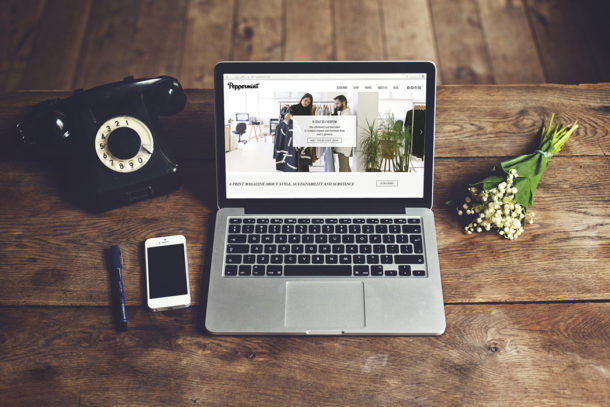
So You Want to… Start Your Own Natural Health Business
According to a recent, self-conducted survey, Endeavour College found almost half (46%) of participants cared more about their health now than before the pandemic. Almost two-thirds (61%) wanted to learn more about health to better care for themselves and their loved ones. It led to the college launching its first suite of short courses – designed to be “relevant and life-applicable” while also empowering students to “take control of [their] own learning”.
In this series, created in partnership with our good friends at Endeavour Short Courses, we’re taking a deep dive to learn more about what the suites entail and expand our knowledge from credible sources. Across the Business Essentials suite, students can learn how to enhance, market and optimise their natural health businesses while prioritising wellness in the workplace and cultivating collaboration and inclusion. We caught up with Endeavour College’s Anthony Turri to learn more.

Tell us a little bit about yourself and your journey…
I’m the national program manager for the massage department at Endeavour College of Natural Health. I’m a lecturer, exercise physiologist, remedial and sports massage therapist, and entrepreneur by trade. I am currently completing my Master of High Performance Sport. I have owned and operated a range of health and wellness businesses over the last 25 years including four multidisciplinary practices, a national corporate health business and a software company that developed business management software for health professionals. I work with professional athletes, heads of corporations, small business owners and students. I have been teaching and mentoring health professionals for 20-odd years and I am lucky enough to be the father of three wonderful children.
READ MORE – So You Want to Learn More About… Nutrition
What are the essential things one needs to consider when starting a new business within the natural health space?
Have I completed a detailed business plan including detailed research and analysis of the business operations, marketing and finances? Do I have the stamina to work harder than I ever have before? Am I willing to accept that this venture may not succeed? Do I have a contingency plan? Most of all, am I going to love doing what I do?
If you answered yes to all of these questions, then you’re well on the way to being prepared. If the answer is no to any of these, then you need to reconsider if you really want to do this or, if you have spent enough time and resources on the planning phase.
Have I completed a detailed business plan including detailed research and analysis of the business operations, marketing and finances? Do I have the stamina to work harder than I ever have before? Am I willing to accept that this venture may not succeed? Do I have a contingency plan? Most of all, am I going to love doing what I do?
What do you think makes a natural health business successful?
A clear strategy, systems and a detailed plan that gets executed obsessively. One that is honest and trustworthy. One that has a clear reason for operating. One that delivers more than they promise, not the other way around. One with a great culture where stakeholders can be honest and respectful with each other and regularly provide feedback that focuses on improving each other and the business.

How can brands cut through an oversaturated market?
Contract, employ and barter with a specialist marketer or brand specialist to help you stand out. A lot of practitioners struggle with little or no budget or, they don’t do their research in finding someone that can help, as they assume it will be too expensive or too difficult.
Provide valuable advice and assistance for your potential market through your communications including on social media.
Don’t be scared to be different, just not so different that you become unrelatable to your business or profession.
Start playing with AI. Of course, it is very early in the lifecycle of AI, but it’s better to start experimenting with it now – potentially getting a jump on your competition. Could it assist you with research or education and possibly be used to reduce outsourcing of your business processes providing you with a competitive advantage?
READ MORE – So You Want to Learn More About… Mindfulness
Where do you think are the best opportunities to strengthen a brand?
If it’s a small business, the best opportunity is in developing, you. Work on you. Always continue to create the best possible version of yourself. This can be done through honest self-reflection, feedback from respected mentors or, by completing small courses that will fill the gaps in skills or knowledge you want and need to develop.
Continue to watch, listen to, speak to, and learn from your target market. Things change rapidly these days and your business model and strategy need to be quite agile.
If it’s a small business, the best opportunity is in developing, you. Work on you. Always continue to create the best possible version of yourself.
Genuinely building corporate social responsibility or, just having social responsibility built into your strategy and processes is a great way to strengthen a brand. The world has been a tough place to live and continues to be for many. What are you genuinely doing to help those in need?
If I could give some advice, it would be: when considering what good you’re going to do, please don’t just do something for the sake of it. Ensure the group(s) you help, and the methods you choose, relate to your business’s product and services to be most effective and genuine.

What is burnout and how does it affect our brain?
The World Health Organisation describes burnout as a syndrome that results from chronic workplace stress that has not been successfully managed. People suffering from burnout have described feeling empty, mentally exhausted, lacking motivation and being beyond caring: “I’m done, truly done. I’ve got nothing left to give, nor do I care to anymore.”
Studies show that burnout can affect parts of the brain called the prefrontal cortex (PFC) and amygdala. The PFC helps us control emotions, suppress impulses and make long-term plans. Burnout can reduce your PFC’s ability to control emotions and increase levels of panic. Burnout can also set your amygdala up to focus on the negative and interpret many situations negatively. Burnout could also impact our ability to concentrate, pay attention and retain memories. This can potentially increase our risk of injuries or accidents and can even make learning more difficult.
Burnout has been described as having three different stages:
ONE // Emotional exhaustion: feeling worn out and drained. Not even a good night’s sleep seems to help.
TWO // Cynicism: being frequently annoyed with others, having a shorter fuse, becoming more cynical of others’ intentions.
THREE // Reduced sense of personal achievement: feeling like you’re doing things ineffectively and feeling like the work you do doesn’t matter.
READ MORE – “Nutrition Is Never Black and White”: How to Make Peace with Your Plate
We live in a society where so often work is prioritised over wellness. Why is it so important to nourish workplace wellness and what would be your top five tips for doing so?
I think anyone in a business can kick this off, but it must be supported, practised and endorsed from the top. CEOs, CFOs and COOs alike need to lead from the front for the best chance of success. It can’t be viewed as something nice the lovely people in HR organise every now and then.
Studies show that workplace wellness increases productivity and reduces days off work. Most importantly it helps build a great culture.
If we want to get technical, to engage the prefrontal cortex, hands-on activities work well, such as arts or cooking. Indulge the senses – especially in nature – and talk to people often. Quieting the mind – whether through sports, long walks or yoga – can also work well.
Studies show that workplace wellness increases productivity and reduces days off work. Most importantly it helps build a great culture.
My five tips would be…
ONE // Make your own lunch, or pre-plan what you’re going to buy to ensure that it’s well-balanced and not just the closest cafe or restaurant.
TWO // Try deep breathing and get regular exercise and quality sleep. Get rid of your electronic devices in the bedroom, buy an alarm, stop binging on episodes of TV shows that will still be there tomorrow and get to bed at a decent time.
THREE // Ask for help. Some may view asking for help as a personal sign of weakness. It’s not. No one will really know if you need help. All you have to do is find the right person to ask.
FOUR // Gain perspective and stop comparing yourself with others: The goal here is to keep working on trying to be the best version of yourself that you can be. If we took some positives out of lockdowns hopefully, they helped teach some of us (who thought the grass is always greener somewhere else) that the grass may actually be green enough exactly where we are. We just needed to stop and take the time to appreciate and be thankful for exactly what we have.
FIVE // It always is (and always has been) about balance. We must strive to achieve as much balance in our lives every single day. To do this we first need to recognise the signs of when our balance is shifting (stress, poor diet, lack of sleep or exercise). Then we need to work on the things we have direct control over and put some of the steps above in place to try to rectify it before it turns into burnout and becomes much more difficult to manage.

When I was close to burnout, I had a cousin visiting from overseas who gave me a little perspective and reminded me about homeostasis. Quite simply, he said, “The difference between you and I at the moment is you just live to work, whereas I work to live. Stop working so hard and get some balance in your life or you’re going to miss all of the really good bits.”
For me, that was the kickstart I needed to help me refocus my energies on what was most important. Hopefully, if you’re in the same boat, it resonates in some way with you too.


